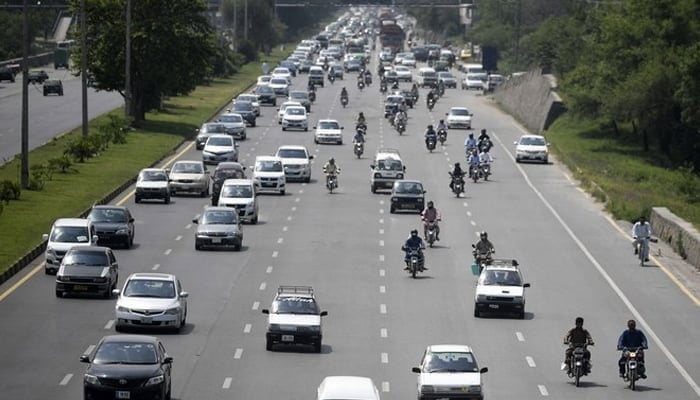Addressing road safety challenges in Pakistan: impact, remedial measures
Road accidents stand as a global menace, claiming a staggering 1.35 million lives annually, as reported by the World Health Organisation. A concerning 75% of fatalities and injuries occur within the economically active age groups of 15-64 years, with a striking 3:1 ratio of male to female casualties.
In Pakistan, the situation is grim, with approximately 27,000 casualties and an annual financial cost of $5.4 billion, placing the country among the worst globally for road safety.
Several factors contribute to this crisis, demanding urgent attention from relevant authorities. Primarily, the lack of widespread awareness concerning traffic rules and safe driving remains a critical issue, fostering frequent violations, pedestrian rights neglect, and an elevated risk of accidents.
The absence of comprehensive awareness campaigns, coupled with inconsistent enforcement, exacerbates this problem. Initiatives such as grassroots education, modern communication channel utilisation, community engagement, and integrating traffic education into school curricula are pivotal for cultivating a culture of safe driving.
Moreover, the country grapples with significant challenges in its road infrastructure, marked by engineering faults, deterioration, inadequate maintenance, and insufficient expansion to accommodate growing traffic demands.
Examples like the Kallar Kahar Salt Range on the Islamabad-Lahore Motorway illustrate the urgent need for improved road engineering. Addressing these concerns demands sustainable planning, increased investments, and strategic maintenance to enhance the quality, safety, and accessibility of road infrastructure, foster economic growth, and ensure safer travel experiences.
The non-standardised driving licencing system in Pakistan contributes to challenges in ensuring consistent standards and competency among drivers. Discrepancies in testing protocols, evaluation criteria, and the issuance of driving permits result from the absence of a unified licencing procedure across regions. Corruption and inadequate training further aggravate these issues. Establishing a standardised and centralised driving licencing system, incorporating modern testing methods, stringent evaluation criteria, and mandatory road safety education, is crucial for reducing road crashes.
Outdated legislation regarding road safety is another critical challenge, hindering effective measures to address modern transportation issues. Existing laws often fail to keep pace with evolving road dynamics, technological advancements, and emerging safety concerns, resulting in inadequate enforcement and loopholes in ensuring comprehensive safety standards. Laws such as the Motor Vehicle Ordinance of 1965 and the National Highway Safety Ordinance of 2000 require revision to align with present-day requirements.
Addressing these challenges through coordinated efforts involving government agencies, the legislature, civil society, and active citizen participation is crucial.
The road to safer highways and motorways in Pakistan is a journey, but every step towards increased awareness is a step in the right direction.
By equipping the masses with relevant knowledge, demanding accountability, and prioritising safety, we can transform the road and driving culture in Pakistan to meet international standards. —Shah Asad Khan (National Highways and Motorways Police)
-
 Jack Black Shares Unseen Moments With Tanya Haden: 'My Love'
Jack Black Shares Unseen Moments With Tanya Haden: 'My Love' -
 Shamed Andrew Made Taxpayers Fund Personal ‘massages’
Shamed Andrew Made Taxpayers Fund Personal ‘massages’ -
 What Could Be Nick Reiner's Fate After Pleading Not Guilty Parents’ Murder Case?
What Could Be Nick Reiner's Fate After Pleading Not Guilty Parents’ Murder Case? -
 Princess Kate Talks About 'hard Conversations' With Kids Amid Andrew Drama
Princess Kate Talks About 'hard Conversations' With Kids Amid Andrew Drama -
 Prince William Mocked For Being ‘most Reluctant’ King-in-waiting
Prince William Mocked For Being ‘most Reluctant’ King-in-waiting -
 Prince William Makes Rare Admission After Andrew Arrest
Prince William Makes Rare Admission After Andrew Arrest -
 ‘Got A Lot Of People Gunning For Me’: Trump Makes First Comments On Mar-a-Lago Intruder
‘Got A Lot Of People Gunning For Me’: Trump Makes First Comments On Mar-a-Lago Intruder -
 What Countries Have A Say In Andrew Removal From Line Of Succession?
What Countries Have A Say In Andrew Removal From Line Of Succession? -
 How Did Luci4 Die? Police Probes 'BodyPartz' Sudden 'suspicious' Death
How Did Luci4 Die? Police Probes 'BodyPartz' Sudden 'suspicious' Death -
 King Charles Criticized By Princess Anne Over Andrew Drama
King Charles Criticized By Princess Anne Over Andrew Drama -
 Hailee Steinfeld Details Preparations Ahead Of Welcoming First Kid With Josh Allen
Hailee Steinfeld Details Preparations Ahead Of Welcoming First Kid With Josh Allen -
 Shocking Details Revealed About Gunman 'Austin Tucker' Shot Dead At Trump’s Resort 'Mar-a-Lago'
Shocking Details Revealed About Gunman 'Austin Tucker' Shot Dead At Trump’s Resort 'Mar-a-Lago' -
 Queen Camilla Meets Gisèle Pelicot, Sends Powerful Message To Victims As Andrew's Scandal Deepens
Queen Camilla Meets Gisèle Pelicot, Sends Powerful Message To Victims As Andrew's Scandal Deepens -
 Cancer-stricken King Charles At Breaking Point?
Cancer-stricken King Charles At Breaking Point? -
 Andrew Leaves King Charles No More Moves To Play: ‘Can’t Just Say We Got Nothing’
Andrew Leaves King Charles No More Moves To Play: ‘Can’t Just Say We Got Nothing’ -
 Sterling K. Brown Explains How Sharing His Kids' Photos On Social Media Can Keep Them Safe
Sterling K. Brown Explains How Sharing His Kids' Photos On Social Media Can Keep Them Safe




